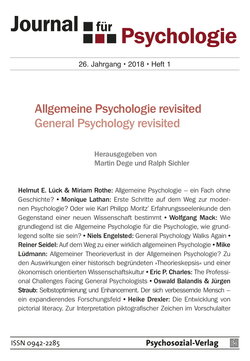Monique Lathan
(PDF)
Sofortdownload
Dies ist ein E-Book. Unsere E-Books sind mit einem personalisierten Wasserzeichen versehen,
jedoch frei von weiteren technischen Schutzmaßnahmen (»DRM«).
Erfahren Sie hier mehr zu den Datei-Formaten.
Seit den 1970er Jahren ist die Psychologie eine der am stärksten expandierenden wissenschaftlichen Disziplinen. Auch ist ihr Gegenstand, die Psyche, aus alltäglichen wie medienöffentlichen Diskursen nicht mehr wegzudenken. Doch wie kam dieser Gegenstand in die Welt? Ein genauerer Blick auf die Anfänge der sich Ende des 18. Jahrhunderts entwickelnden Psychologie zeigt, dass die wissenschaftliche Konstruktion der Seele einer Logik folgt, die bis heute erfolgreich zu sein scheint. Menschliches Handeln scheint darin nicht schlicht einem je konkreten Willensinhalt zu folgen, der sich Gründen und Zwecken verdankt, die sich das Individuum setzt. Vielmehr werden hinter allen willentlichen Akten zugleich ganz unwillentliche Prozesse vermutet und es wird versucht, ihnen als das Handeln leitende Kräfte auf die Spur zu kommen. So etabliert und selbstverständlich dieser Gedanke gerade heute scheinen mag, so weitreichend sind die ihm eigenen Implikationen und Konsequenzen für die theoretische Bestimmung der menschlichen Individualität. Diese Logik bloßzulegen nimmt sich der Artikel am Beispiel von Karl Philipp Moritz’ Erfahrungsseelenkunde vor.
Abstract:
Since the 1970s, psychology has been one of the most expanding scientific disciplines. Also its object, the psyche, has become an integral part of everyday and media discourses. But how has this object appeared in the world? A closer look at the beginnings of psychology at the end of the 18th century reveals that the scientific construction of the psyche follows an up to day successful logic. Accordingly, human action appears not to simply flow from a concrete will with a rationale and a purpose set by the individual. Rather, behind deliberative acts non-deliberative processes are suspected, and are sought to be revealed as action-guiding forces. As established and self-evident as this thought nowadays appears, as far-reaching are its immanent implications and consequences for the theoretical definition of human individuality. In taking Karl Philipp Moritz’ »Erfahrungsseelenkunde« as an example, this article seeks to disclose this logic.
Abstract:
Since the 1970s, psychology has been one of the most expanding scientific disciplines. Also its object, the psyche, has become an integral part of everyday and media discourses. But how has this object appeared in the world? A closer look at the beginnings of psychology at the end of the 18th century reveals that the scientific construction of the psyche follows an up to day successful logic. Accordingly, human action appears not to simply flow from a concrete will with a rationale and a purpose set by the individual. Rather, behind deliberative acts non-deliberative processes are suspected, and are sought to be revealed as action-guiding forces. As established and self-evident as this thought nowadays appears, as far-reaching are its immanent implications and consequences for the theoretical definition of human individuality. In taking Karl Philipp Moritz’ »Erfahrungsseelenkunde« as an example, this article seeks to disclose this logic.
Martin Dege & Ralph Sichler S. 3–8Editorial (PDF)
Helmut E. Lück & Miriam Rothe S. 9–29 (PDF)
Monique LathanS. 30–48 (PDF)
Wolfgang MackS. 49–73 (PDF)
Niels EngelstedS. 74–96General Psychology Walks Again (PDF)
Reiner SeidelS. 97–122 (PDF)
Mike LüdmannS. 112–122 (PDF)
Eric P. CharlesS. 123–130The Professional Challenges Facing General Psychologists (PDF)
Oswald Balandis & Jürgen Straub S. 131–155Selbstoptimierung und Enhancement (PDF)
Der sich verbesserndeMensch - ein expandierendes ForschungsfeldHeike DrexlerS. 156–177 (PDF)
Helmut E. Lück & Miriam Rothe S. 9–29 (PDF)
Monique LathanS. 30–48 (PDF)
Wolfgang MackS. 49–73 (PDF)
Niels EngelstedS. 74–96General Psychology Walks Again (PDF)
Reiner SeidelS. 97–122 (PDF)
Mike LüdmannS. 112–122 (PDF)
Eric P. CharlesS. 123–130The Professional Challenges Facing General Psychologists (PDF)
Oswald Balandis & Jürgen Straub S. 131–155Selbstoptimierung und Enhancement (PDF)
Der sich verbesserndeMensch - ein expandierendes ForschungsfeldHeike DrexlerS. 156–177 (PDF)

